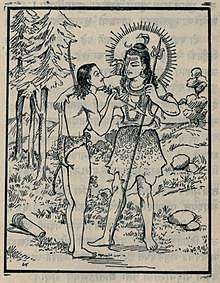Pashupatastra
The Pashupatastra (IAST: Pāśupatāstra, sanskrit: पाशुपतास्त्र; the weapon of Pasupati, an epithet of Shiva) in Hindu mythology is an irresistible and most destructive personal weapon of Shiva, Kali and Adi Para Shakti, which can be discharged by the mind, the eyes, words, or a bow. Never to be used against lesser enemies or by lesser warriors, the Pashupatastra is capable of destroying creation and vanquishing all beings. Pashupatastra is the most destructive, powerful, irresistible weapon mentioned in the Hindu mythology. In Mahabharata; only Arjuna and in Ramayana; sage Vishvamitra possessed Pashupatastra.[1][2] It is one of the six 'Mantramukta' weapons that cannot be resisted.[3]

A Narrative from Kisari Mohan Ganguli's translation of Mahabharat regarding the power of Pashupatastra:[4]
"O thou of mighty arms, that weapon (Pashupatastra) is superior to the Brahma, the Narayana, the Indra, the Agneya, and the Varuna weapons. Verily, it is capable of neutralizing every other weapon in the universe. It was with that weapon that the illustrious Mahadeva had in days of yore, burnt and consumed in a moment the triple city of the Asuras. With the greatest ease, Mahadeva, using that single arrow, achieved that feat. That weapon, shot by Mahadeva's arms, can, without a doubt consume in half the time taken up by a twinkling of the eyes the entire universe with all its mobile and immobile creatures. In the universe there is no being including even Brahma and Vishnu and the deities, that are incapable of being slain by that weapon."[5]
Arjuna's penance for Pashupatastra
After the battle at Khandava, Indra had promised Arjuna to give him all his weapons as a boon for matching him in battle with the requirement that Shiva is pleased with him. Following the advice of Lord Krishna to go on meditation or tapasya to attain this divine weapon, Arjuna left his brothers for a penance on Indrakeeladri Hill in Vijayavatika Present day known as Vijayawada
The legend of this place (Vijayawada) revolves around Arjuna – the greatest archer and one of the five Pandavas. Before going to the Mahabharata war, it is believed that Lord Krishna advised Arjuna to visit this place (Vijayawada) and worship Lord Shiva here. On knowing about Arjuna's penance, Duryodhana sent a demon Mookasura to kill Arjuna. Demon Mookasura took the form of a wild boar to interrupt Arjuna's worship. On knowing this, Lord Shiva appeared there in the form of a hunter. It is also believed that the four Vedas followed the lord in the form of dogs to protect Arjuna. Arjuna shot an arrow on the boar and killed it. At the same time, Lord Shiva had also released an arrow from his bow. There after a scuffle arose between the two as to whose arrow had killed the boar. The scuffle leads to a fight and Arjuna broke Lord Shiva's bow since Arjuna fought with his Gandiva and Shiva came with normal bow but not Pinaka. Then both of them were involved in sword fight and wrestling. Lord Shiva sliced and stabbed Arjuna many times and blood started flowing out like a stream. Lord Shiva cut off Arjuna's sword due to which they began wrestling. Lord Shiva lifted and threw down Arjuna many times. Still Arjuna raised and was ready to attack. At last Arjuna realised that the hunter was none other than Lord Shiva himself and begged his pardon. Lord Shiva and Goddess Parvathi gave darshan to Arjuna and blessed him with the Pashupatastra. Lord Shiva also told Arjuna that he was tired of fighting with Arjuna and impressed with him more than his student Parashurama. Lord Shiva also coined Arjuna- the name "Vijaya" (invincible). From this Arjuna was also popularly known as Vijaya.
After Shiva left, the Lokapalas appeared before Arjuna and then Kubera, Yama, and Varuna also blessed each of their potent weapons to Arjuna. Indra then invited his son to his palace in heaven.
Arjuna was amazed at the splendor of his father's palace at Amaravati. Dancers like Urvashi, Tilottama, Rambha and Menaka entertained him. There was a huge banquet serving different varieties of heavenly dishes. Arjuna learnt song and dance from the Gandharva, Chitrasena and Indra himself taught him all the divine weapons and also gave him his Vajra. Many other gods also blessed Arjuna with their respective divine weapons[6]
References
- Sharma, Arvind; Khanna, Madhu (15 February 2013). Asian Perspectives on the World's Religions after September 11. ABC-CLIO. ISBN 9780313378973.
- Sharma, Mahesh; Chaturvedi, B. K. (2006). Tales From the Mahabharat. Diamond Pocket Books (P) Ltd. ISBN 9788128812286.
- Oppert, Gustav Salomon (1880). On the Weapons, Army Organisation, and Political Maxims of the Ancient Hindus: With Special Reference to Gunpowder and Firearms. Higginbotham. p. 30.
Narayanastra most powerful.
- "The Mahabharata, Book 3: Vana Parva: Kairata Parva: Section XL". www.sacred-texts.com. Retrieved 14 January 2018.
- Web Link: https://www.sacred-texts.com/hin/m13/m13a014.htm
- "The Mahabharata, Book 3: Vana Parva: Indralokagamana Parva: Section XLIV". Retrieved 3 August 2016.
Resources
- Dictionary of Hindu Lore and Legend (ISBN 0-500-51088-1) by Anna Dallapiccola